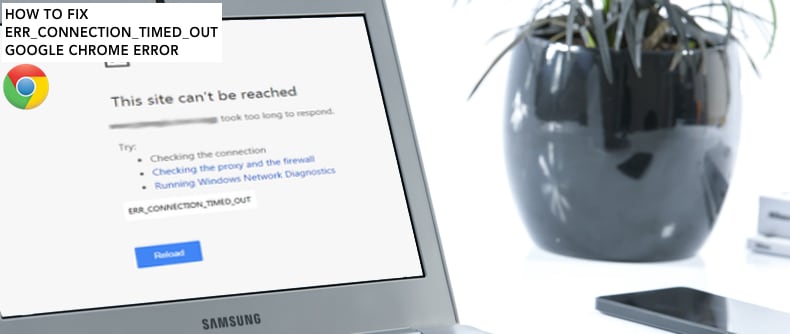ERR_CONNECTION_TIMED_OUT | 6 Ways to Fix It
Get Free Scanner and check your computer for errors
Fix It NowTo fix found issues, you have to purchase the full version of Combo Cleaner. Free trial available. Combo Cleaner is owned and operated by Rcs Lt, the parent company of PCRisk.com read more.
How to Fix ERR_CONNECTION_TIMED_OUT Error in Windows 10
You may have experienced the ERR_CONNECTION_TIMED_OUT error due to Internet connection issues. This article will help you fix this error.

ERR_CONNECTION_TIMED_OUT usually means that there are problems on the client side, such as internet connection issues. The error occurs mainly due to problems with the DNS (Domain Name System) server. This error can occur in Google Chrome, Mozilla Firefox, and others.
As the error message states, to fix the problem, you should check your connection, check proxy and firewall settings, and run Windows Network Diagnostics. One of these methods should solve the problem. However, other fixes exist, such as flushing the DNS, changing the DNS server, checking the Windows Hosts file, and updating network adapter drivers.
Fortunately, it is possible to fix this error if there are problems with the operating system rather than the ISP (Internet Service Provider). In other words, if the cause of the error is on the client side, there are various methods to solve the problem.
In the guide below, we outline these methods in detail so that you can browse the Internet.
Video Showing How to Fix ERR_CONNECTION_TIMED_OUT Error
Table of Contents:
- Introduction
- Flush DNS and Renew IP
- Use Google DNS
- Clear Browsing Data
- Check LAN Settings
- Temporarily Disable Your Antivirus
- Update Network Adapter's Driver
- Video Showing How to Fix ERR CONNECTION TIMED OUT Error
Download Computer Malware Repair Tool
It is recommended to run a free scan with Combo Cleaner - a tool to detect viruses and malware on your device. You will need to purchase the full version to remove infections. Free trial available. Combo Cleaner is owned and operated by Rcs Lt, the parent company of PCRisk.com read more.
Flush DNS and Renew IP
Start with this method, which works for most users who encounter the "ERR_CONNECTION_TIMED_OUT" error. The method includes entering and executing "ipcofig" and "netsh" commands into Command Prompt.
Ipconfig is a command-line tool that displays the current configuration of the installed IP stack on a networked computer. Using this tool, we can flush and reset the contents of the DNS client resolver cache and renew the DHCP configuration.
Netsh is a command-line scripting utility that allows you to (either locally or remotely) display or modify the network configuration of a computer that is currently running. Netsh also provides a scripting feature to run a group of commands in batch mode against a specified computer.
The commands require an elevated Command Prompt opened with administrator privileges. To open an elevated Command Prompt, type "command prompt" in Search and right-click on the "Command Prompt" result. Choose "Run as administrator" to run it with administrative privileges. When you select "Run as administrator", a User Account Control prompt will appear asking if you allow the Command Prompt to make changes to your computer. Click "Yes".

Elevated Command Prompt will appear. In the Command Prompt window, type these commands and press Enter after each:
ipconfig /release
ipconfig /flushdns
ipconfig /renew
netsh winsock reset

Restart your computer and see if "ERR_CONNECTION_TIMED_OUT" persists.
Use Google DNS
Google's Public DNS is a free alternative Domain Name System (DNS) service offered to internet users worldwide. The public DNS service and servers are maintained and owned by Google. It functions as a recursive name server providing domain name resolution for any host on the Internet.
We recommend that you use Google DNS for a faster and more secure connection. You must change the DNS manually, as described below.
To change your DNS server to Google's DNS server, go to Network Connections settings. Right-click the Start menu and select "Network Connections", or go to Settings and click "Network & Internet".

In the Network & Internet settings window, select your connection type (in our case, "Ethernet") on the left pane and then click "Change adapter options" on the right pane.

Right-click on your connection and select "Properties" from the drop-down menu.

Select "Internet Protocol Version 4 (TCP/IPv4)" and click "Properties".

In the Internet Protocol Version 4 (TCP/IPv4) Properties window, select "Use the following DNS server addresses", enter 8.8.8.8 as the "Preferred DNS server" and 8.8.4.4 as the "Alternate DNS server". Click "OK" to save changes.
Restart your computer and see if the error is fixed.

Clear Browsing Data
Browsing data consists of a record of web pages you have visited in past browsing sessions and typically includes the name of the website and its corresponding URL. Other private data components, such as cache, cookies, saved passwords, etc., are also saved during your browsing session. This stored data can slow down your browser and browsing experience and even cause problems such as the "ERR_CONNECTION_TIMED_OUT" error.
To clear Google Chrome's browsing data cache, click the three dots in the top-right corner, select "More tools", and click "Clear browsing data...".

Select the data you want to remove from the Google Chrome browsing cache in the Clear browsing data window and click the "CLEAR DATA" button.
Close Chrome and open it again - see if the "ERR_CONNECTION_TIMED_OUT" still occurs when you try to visit web pages.

Check LAN Settings
To check your LAN settings, open the Run dialog box by pressing the Windows key + R or right-clicking Start and selecting "Run" from the contextual menu.

Type the "inetcpl.cpl" command in the Run dialog box and press Enter or click OK. The Internet Options window will appear.

In the Internet Options window, look for the "Connections" tab and click it. Then, click the "LAN Settings" button.

Make sure that "Automatically detect settings", "Use automatic configuration script", and "Use a proxy server for your LAN (These settings will not apply to dial-up or VPN connections)" checkboxes are not ticked.
Click OK to save the changes and see if the "ERR_CONNECTION_TIMED_OUT" is now fixed.

Temporarily Disable Your Antivirus
Your antivirus (anti-malware) software may be blocking access to some or all websites. To ensure that installed third-party antivirus software is not causing this error, we recommend that you temporarily disable it and check if the error persists. If disabling (or uninstalling) your antivirus helps, we recommend that you switch to another antivirus software (or try reinstalling the current one).
If you are unsure how to disable antivirus software, read this guide to find instructions on disabling some of the most popular antivirus programs.
Update Network Adapter's Driver
A device driver tells the operating system and other software how to interact with specific hardware. If the appropriate driver is not installed, the device might not function properly. To reinstall the network adapter driver, use Device Manager.
To open Device Manager, right-click the Start button and select the "Device Manager" result from the contextual menu or type "device manager" in Search and click the "Device Manager" result.

In Device Manager, you will see a list of devices connected to your computer. Find "Network adapters", expand it, and right-click your networking device. Select the "Update driver" option from the contextual menu.

You will be asked to search for updated driver software automatically or to browse your computer for driver software. If you select the first option, Windows will search your computer and the Internet for the latest driver software for your device.
If you select the second option, you must locate and install the drivers manually. Using this option requires having previously downloaded drivers on your computer or USB flash drive. We recommend that you select the first option and follow the instructions.

The first option does not solve the problem, download the latest network adapter driver from the manufacturer's website, or reinstall the driver. To reinstall it, choose the "Uninstall device" option when right-clicking on the network adapter.
Mark the "Delete the driver software for this device" checkbox if you see this option. Then Restart your computer and see if it fixed the "ERR_CONNECTION_TIMED_OUT" error.
If you have tried all of the above and this error still persists, you might want to contact your Internet Service Provider (ISP) and find out if the problem is at their end. You can also simply switch to another browser and check if you can visit websites.
If you know of other solutions to this problem not mentioned in our guide, please share them with us by commenting below.
Share:

Rimvydas Iliavicius
Researcher, author
Rimvydas is a researcher with over four years of experience in the cybersecurity industry. He attended Kaunas University of Technology and graduated with a Master's degree in Translation and Localization of Technical texts. His interests in computers and technology led him to become a versatile author in the IT industry. At PCrisk, he's responsible for writing in-depth how-to articles for Microsoft Windows.

▼ Show Discussion